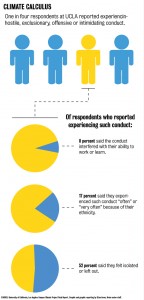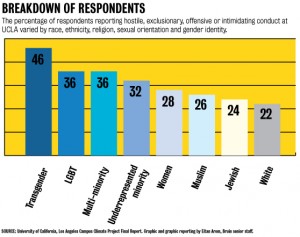In general, one in four is not bad odds.
But when one in four members of the UCLA community report experiencing hostile, exclusionary, intimidating or offensive conduct, it becomes necessary to do everything possible to decrease that number.
Among the data released as part of the University of California Campus Climate Study were some statistics that merit an immediate and direct response from administrators. But unfortunately, that response has been less than forthcoming.
In the portion of the study that focused on UCLA, notable statistics include the fact that 24 percent of respondents (nearly one in four) “believed that they had experienced exclusionary, intimidating, offensive and/or hostile conduct” on campus. Of those, 8 percent reported that this type of behavior had “interfered with their ability to work or learn.” 
In response to the survey, Chancellor Gene Block and the Council on
Diversity and Inclusion, which he chairs, will be meeting in the upcoming months to discuss action plans for improvement.
In his statement to the community about the survey, Block was quick to point out the university will be searching for a vice chancellor for equity, diversity and inclusion and that it is currently in the process of recruiting two discrimination prevention officers.
But far from a direct response to the climate survey, these new hires are a pre-existing measure put in place mainly to address discrimination among faculty. Administrators at UCLA have yet to announce any new or additional provisions that would seek to push the campus climate numbers in a positive direction, particularly in regard to students.
The vice chancellor position was originally announced after the UCLA Moreno Report, which was released in October, found “widespread concern among faculty members that the racial climate at UCLA had deteriorated over time, and that the university’s policies and procedures are inadequate to respond to reports of incidents of bias and discrimination.”
But since then, no significant progress has been made on the position other than the announcement of a search committee and Block’s statement that they hope to make the appointment in the 2014-2015 school year.
These solutions are months off. And that’s only the timeline for hiring, which doesn’t even take into account how long it will take to begin actually implementing programs that help with inclusion or issues of discrimination on our campus.
Besides, campus climate is about more than incidents of discrimination or hate – it’s about community members feeling comfortable on a day-to-day basis. The new vice chancellor will hopefully serve as a central hub for addressing discrimination incidents, but no number of new administrators can proactively change the way members of the community treat one another.
Instead, administrators must make a ground-level effort to address a cripple culture of community interaction by pushing for workshops, campus events, publicity campaigns and cultural programming that can change hostile attitudes at UCLA.
Campus climate has received a great deal of attention at UCLA, but unfortunately most of this focus has been reactive, flaring up in the wake of hostility and dissension.
Most recently, the bitter aftermath of the divestment resolution brought before the student government in February engendered hard feelings among many campus groups.
Earlier this year, a racist and sexist flier was sent to the UCLA Asian American Studies Center, with a similar flier being posted on a Vietnamese Student Union sign in 2012. The year before, a racist rant from a student complaining about Asian students in the library found its way onto Youtube and went viral.
While there are pages upon pages of statistics in this report, they ultimately reaffirm something we already knew: Campus climate at UCLA is problematic and needs to be addressed.
It would be unfair to ignore the positive aspects of the report: 80 percent of participants felt “comfortable” or “very comfortable” with the climate at UCLA. But numbers like this can obscure some of the fundamental truths on campus that were confirmed by the study, such as the fact that a sizable minority of students do not feel comfortable on campus.
The campus climate report provides a wealth of statistics that can allow UCLA administrators to create a targeted and in-depth response to climate issues faced by faculty, staff and other community members. An administrative hire won’t fix something as complicated and multifaceted as our campus climate.
The numbers are clear – campus climate is a problem here at UCLA, and more tangible and immediate efforts need to be made beyond lip service and stock solutions.
Send general comments to opinion@media.ucla.edu or tweet us @DBOpinion.

So many punks at this school love to whine and moan about everything, but they love to criticize those with moral compasses